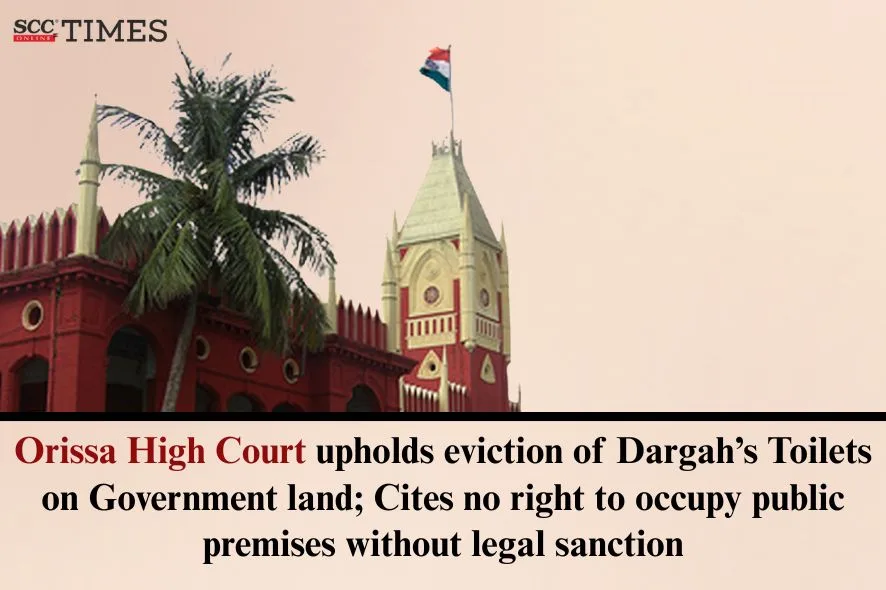Orissa High Court: The present petition was filed by the petitioner, Lal Baba Dargah (‘Dargah’), a religious institution, challenging the initiation of eviction proceedings under the Orissa Public Premises (Eviction of Unauthorised Occupants) Act, 1972 (‘Public Premises Act’), and the subsequent orders passed by the Collector and the Sub-Collector-cum-Estate Officer (‘Sub-Collector’), Sadar, Sundargarh. A Single Judge Bench of Dr. S.K. Panigrahi, J., while dismissing the petition, upheld that the land classified as “Rasta”, located within the territorial jurisdiction of Rajgangpur Municipality and recorded in the name of the State Government, clearly fell within the definition of “public premises” under Section 2(f) of the Public Premises Act. The Court concluded that the petitioner’s distinction between land recorded as “Rasta” and “public premises” was misconceived and contrary to the enactment’s plain language and scheme.
Background:
The petitioner, a religious institution of the Muslim community situated at Rajgangpur, District Sundargarh, had a long-standing history of worship and community service. The land in question, adjacent to the dargah, was used to build thirteen toilets and bathrooms, comprising six for women and seven for men, by the Lal Baba Managing Committee due to the absence of sanitation facilities as provided by the civic or governmental authorities. These facilities were maintained by the dargah and had been used, free of cost, by members of all communities for over four decades, thereby serving an essential public purpose.
In 2015, the Sub-Collector issued a notice under Section 4(1) of the Public Premises Act alleging unauthorised encroachment. The petitioner was called upon to show cause as to why an order of eviction should not be passed, and upon recording that no reply had been filed by the petitioner to the show cause notice, an order of eviction was passed, directing the Dargah to vacate the premises.
Aggrieved by the eviction order, the petitioner filed a writ petition before this Court, but while disposing of the writ petition, the Court had directed the petitioner to avail the statutory remedy of appeal before the competent authority. Subsequently, the Collector upheld the eviction in July 2016, stating that the land stood recorded in the name of the Government and was classified as “Rasta”.
The petitioner argued that the land described in the notice was recorded as “Rasta”, which should be governed by the Orissa Prevention of Land Encroachment Act, 1972 (the ‘Land Encroachment Act’), and not the Public Premises Act and therefore the proceeding initiated under the said Act was without jurisdiction and not maintainable in law. The petitioner further argued that inadequate time was provided to respond to the eviction notice, as only two days were given to prepare and submit a response before the scheduled hearing, thereby depriving it of a reasonable opportunity to be heard.
The petitioner asserted that the road in front of the Dargah was the widest within Rajgangpur Municipality, and the structured housing the sanitation units were situated on the adjoining land in a manner that did not cause any obstruction to public passage or vehicular traffic. It was further alleged that the eviction orders were ex facie illegal, without jurisdiction, and violative of Articles 14, 16, and 21 of the Constitution, and were liable to be quashed.
The State opposed the contentions and affirmed that the land in question was recorded in the name of the Government and classified as “Rasta” and since it fell within the jurisdiction of Rajgangpur Municipality, the provisions of the Public Premises Act were squarely attracted. The State further asserted that permitting unauthorised structures to remain on land classified as “Rasta” would undermine public infrastructure and hinder planned civic development.
Analysis and Decision:
The Court examined the applicability of the Public Premises Act and reiterated that the definition of the “public premises” under Section 2(f) of the Public Premises Act included any premises situated within the jurisdiction of a Municipal Council, Notified Area Council, or an area declared by the State Government. The Court observed that the land in dispute, classified as “Rasta,” lied within the territorial jurisdiction of Rajgangpur Municipality, and stood recorded in the name of the State Government, clearly established that it fell within the definition of “public premises” under the Public Premises Act.
The Court dismissed the petitioner’s attempt to draw a distinction between land recorded as “Rasta” and “public premises”and concluded that it was misconceived and contrary to the enactment’s plain language and scheme. The Court noted that the petitioner was served with proper notice and was directed to avail the statutory remedy of appeal. Further, the Court observed that the petitioner was afforded adequate opportunity to participate in the proceedings, and no material irregularity or violation of the principles of natural justice was discernible in the conduct of the authorities
The Court acknowledged that while the construction was done for public utility, unauthorised use of public premises, even if purported to serve a public purpose, could not be legitimised unless regularised in accordance with law. Since no ground was made out for interference in the orders of the Sub-Collector and Collector, the Court, therefore dismissed the petition.
[Lal Baba Dargah v. State of Orissa, 2025 SCC OnLine Ori 2875, decided on 18-7-2025]
Advocates who appeared in this case:
For the Petitioner: A.K. Nanda, Adv. along with G.N. Sahu, Adv.
For the Opposite Party: Sarita Moharana, ASC


